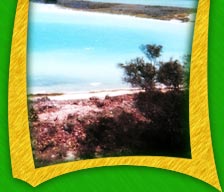|
GOVERNMENT INTEREST
During the mid-1800’s, the U.S. government
began construction of Fort Jefferson to control navigation into the
Gulf of Mexico and protect
Atlantic-Mississippi River bound trade. Approximately 16 million
hand-made bricks were used to create the three-tiered, six-sided,
fortress that lies atop Garden Key. Although construction was never
finished, Fort Jefferson became the nation’s biggest coastal
fort, as well as the largest masonry structure in the Western Hemisphere,
earning the name “Gibraltar of the Gulf.”
During the Civil War, the fort served as a Union military prison
for captured
deserters and other criminals. Among its more famous inmates were
four men convicted of complicity in the assassination of President
Abraham Lincoln, including the infamous Dr. Mudd. At its peak,
the fort was home to more than 2,000 civilians, slaves, prisoners,
and various military personnel. Shortly after the Army released the
fort to the Marine-Hospital service, President Franklin D. Roosevelt
designated the area as Fort Jefferson National Monument. However,
to ensure protection of the area’s natural and historic features,
Fort Jefferson and the surrounding islands were re-established as
Dry Tortugas National Park on October 25, 1992.
PROTECTING THE DRY TORTUGAS
In July 2001, the combination of Dry
Tortugas National Park’s
46-square mile Research Natural Area (RNA) and its adjacent Tortugas
Ecological Reserve in Florida Keys National Marine Sanctuary created
the largest no-take marine reserve within the continental United
States. Created as a haven for species affected by loss of
habitat and over-fishing, the RNA provides snorkelers, divers, boaters,
and researchers the opportunity to enjoy the beautiful marine environment
while still protecting important coral reef ecosystems. Under
the new general management plan, the park will be divided into four
major zones: Historic Preservation zone, Natural /Cultural zone,
Research Natural Area (RNA) zone, and Special Protection zone.
Resources for this article
have been provided by Wikipedia and
the National Park
Service.
|










